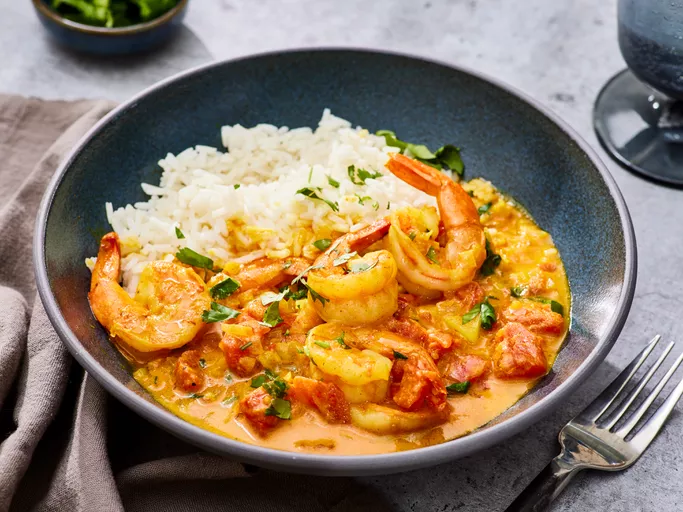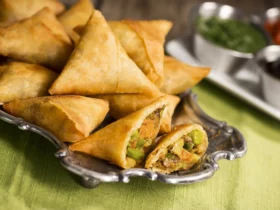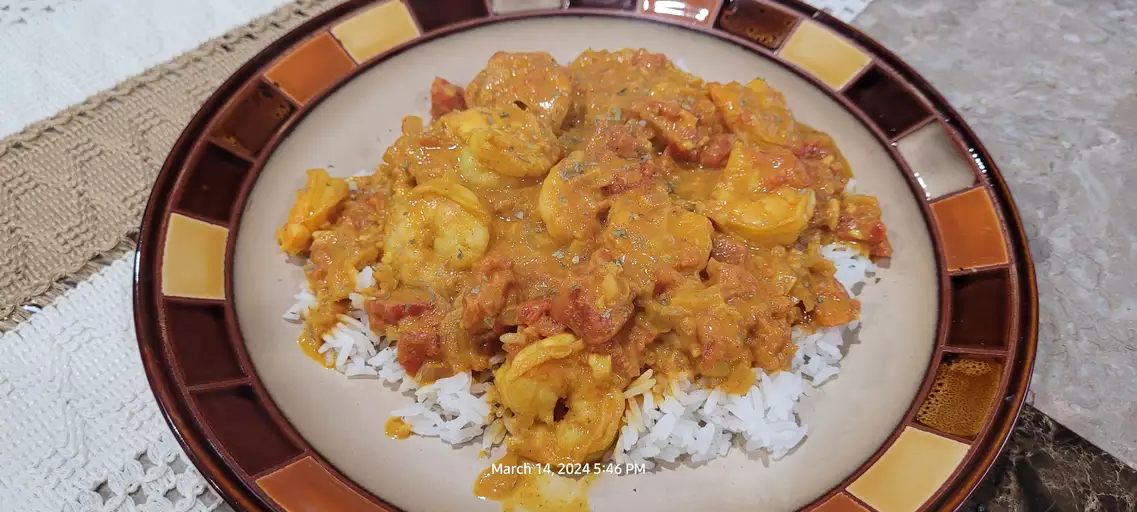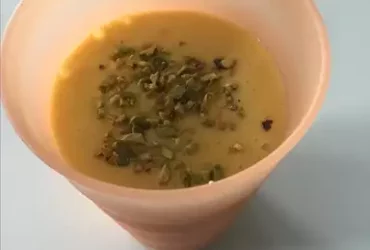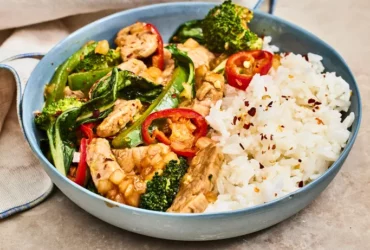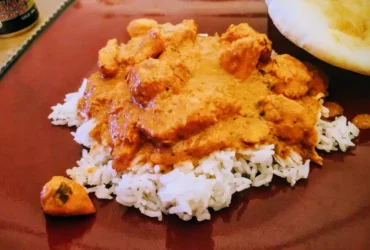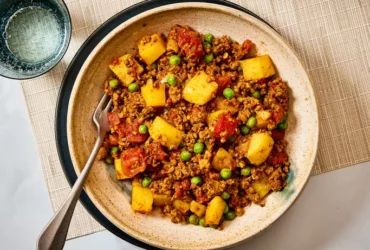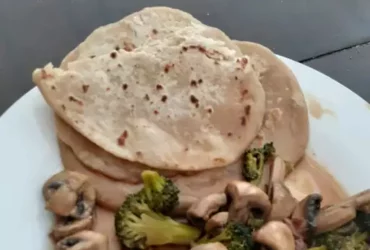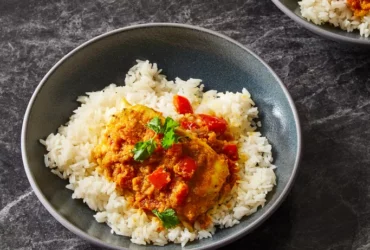Ingredients
Essential Spices and Herbs
The Indian Shrimp Curry recipe requires a combination of ingredients that will give it a rich and authentic flavor. The key to making a great curry lies in using the right spices, herbs, and ingredients.
Essential Ingredients
The following are the essential ingredients required for this recipe:
- 1 pound large shrimp, peeled and deveined
- 2 medium onions, thinly sliced
- 3 cloves of garlic, minced
- 1 medium ginger, grated
- 1 can (14 oz) diced tomatoes
- 1 cup fish broth or water
- 2 tablespoons vegetable oil
- Salt and pepper to taste
- Cilantro leaves for garnish
Essential Spices
The following are the essential spices required for this recipe:
- Curry Powder: This is a blend of ground spices that typically includes turmeric, coriander, cumin, cinnamon, cardamom, and red pepper. Use 2-3 tablespoons depending on your desired level of spiciness.
- Garam Masala:This is another blend of ground spices that adds warmth and depth to the curry. Use 1/2 teaspoon.
- Cumin: Ground cumin adds a warm, earthy flavor to the curry. Use 1/4 teaspoon.
- Turmeric:This spice gives the curry its characteristic yellow color and has anti-inflammatory properties. Use 1/2 teaspoon.
Essential Herbs
The following are the essential herbs required for this recipe:
- Cilantro:This herb is commonly used as a garnish and adds a fresh, citrusy flavor to the curry. Use chopped cilantro leaves.
Remember that the key to making a great Indian Shrimp Curry lies in balancing the flavors of the spices, herbs, and ingredients. Adjust the amounts according to your taste preferences and enjoy!
Turmeric 1 teaspoon, Cumin Seeds 1/4 teaspoon, Coriander Powder 1/2 teaspoon, Red Chili Powder 1/2 teaspoon, Garam Masala 1/4 teaspoon, Freshly Ground Black Pepper to taste
Turmeric
This vibrant and aromatic spice plays a crucial role in enhancing the color and flavor of the Indian Shrimp Curry. With its distinct earthy and slightly bitter taste, turmeric adds depth to the dish. The recommended amount of 1 teaspoon will provide an adequate balance between flavor and visual appeal.
Cumin Seeds
These tiny seeds pack a punch when it comes to flavor and aroma. With their warm, earthy, and slightly spicy undertones, cumin seeds complement the other spices beautifully in the curry. The suggested quantity of 1/4 teaspoon ensures that they don’t overpower the dish but still contribute significantly to its overall character.
Coriander Powder
This powder is a staple spice in Indian cuisine, known for its warm, citrusy, and slightly sweet flavor. Coriander adds a lovely depth to the curry, and 1/2 teaspoon will provide an adequate amount without overpowering the dish. It pairs particularly well with the other spices mentioned here.
Red Chili Powder
As the name suggests, this spicy powder adds a bold and intense heat to the curry. With its smoky flavor, red chili powder enhances the overall flavor profile of the dish. Use 1/2 teaspoon to add a moderate level of heat without making the curry overwhelming for those who prefer milder flavors.
Garam Masala – This blend of ground spices is often referred to as “warm spice” due to its aromatic and slightly sweet properties. Garam masala adds warmth and depth to the curry, balancing out the spicier elements. Use a small amount of 1/4 teaspoon to maintain harmony in the flavor profile.
Freshly Ground Black Pepper – This classic seasoning adds a pungent and invigorating flavor to any dish. For this Indian Shrimp Curry, use black pepper to taste, adding it towards the end of cooking to prevent bitterness from developing. Freshly grind your black pepper for optimal flavor and aroma.
Seafood and Liquid Ingredients
The key to a great Indian shrimp curry lies in the selection and preparation of its ingredients.
In this recipe, we will be using a variety of ingredients that are commonly found in Indian cuisine.
For the seafood ingredient, we will be using fresh or frozen shrimp, preferably with shells on for added flavor.
The liquid ingredients used in this curry include coconut milk, water, and yogurt, which provide richness, creaminess, and a tangy kick, respectively.
We also need to add aromatics like onions, garlic, ginger, and cilantro, which will be sautéed at the beginning of the recipe to create a flavorful base.
The spices used in this curry are essential for its flavor profile and include ground cumin, coriander powder, garam masala, turmeric, red chili powder, and salt, which can be adjusted according to personal taste preferences.
Additionally, you may want to add other ingredients like lemon juice or vinegar for added brightness and a pinch of cayenne pepper for extra heat.
Lastly, be sure to check the quality of your ingredients before starting the recipe, as fresh and high-quality ingredients will result in a better-tasting dish.
In terms of quantity, you can adjust the amount of each ingredient according to your personal taste preferences and the number of people you are serving.
Large Shrimp (2125 count) 1 pound, Coconut Milk 1 can, Water 1 cup, Lemon Juice 2 tablespoons
The ingredients used in this Indian Shrimp Curry recipe are carefully selected to bring out the authentic flavors and textures of traditional Indian cuisine.
The Large Shrimp (2125 count) 1 pound is a crucial component, providing protein and texture to the dish. The quantity of 1 pound allows for a generous serving size, suitable for a medium-sized crowd or multiple meals.
Coconut Milk 1 can serves as a creamy base, adding richness and depth to the curry sauce. The canned version is convenient and easy to use, eliminating the need for fresh coconut meat and its associated prep work.
Water 1 cup helps thin out the curry sauce to achieve the desired consistency, making it easier to coat the shrimp evenly. This quantity of water also allows for a moderate level of thickness, preventing the sauce from becoming too runny or overwhelming.
Lemon Juice 2 tablespoons adds a touch of acidity and brightness to balance out the bold flavors in the dish. The citrus note cuts through the richness of the coconut milk and enhances the overall flavor profile.
Pan Preparation
Frying the Onions and Ginger
To prepare the pan for frying the onions and ginger, it’s essential to heat a large skillet or saucepan over medium-low heat.
This prevents the ingredients from burning and promotes even cooking. You can use any type of pan you like, but a stainless steel or non-stick pan works best for this purpose.
Next, add 2-3 tablespoons of oil to the preheated pan. For Indian cuisine, it’s common to use oils like vegetable oil, peanut oil, or mustard oil for sautéing onions and ginger.
Carefully place 1 large onion, peeled and thinly sliced, into the hot oil. If using a non-stick pan, you can cook the onions in just one layer; otherwise, you may need to cook them in batches depending on the size of your pan.
Reduce heat to low-medium if necessary, as the onions start to release their moisture and caramelize. Stir occasionally until they become translucent, which should take around 8-10 minutes.
A few minutes before the onions are done, add 1-inch piece of fresh ginger, peeled and grated, into the pan. You can use a food processor or microplane grater to get the perfect consistency for your curry paste.
Stir-fry the ginger with the onions until they are well combined and the mixture is fragrant. Be gentle when stirring as you don’t want to break up the ginger too much.
The aroma of sautéed onions and ginger will fill your kitchen, signaling that it’s time to add more spices and continue cooking your Indian Shrimp Curry Recipe.
Heat Oil in a Large Pan over medium heat. Sauté Chopped Onion 2 medium until it’s translucent (about 5 minutes). Add Ginger Paste 1 tablespoon, mix well for another minute.
- The first step in preparing a delicious Indian shrimp curry is to heat oil in a large pan over medium heat.
- This process is crucial as it allows the flavors to meld together and the spices to release their aroma.
Here are the steps to heat oil in a large pan:
- Start by choosing the right type of oil for Indian cooking, such as vegetable or canola oil.
- These oils have a high smoke point and will not break down easily when heated.
- Pour 2-3 tablespoons of oil into a large pan over medium heat. You can use a stainless steel or non-stick pan for this purpose.
- Let the oil heat up for about 2-3 minutes, until it reaches the desired temperature.
Next, add chopped onion to the hot oil and sauté until it’s translucent. Here are some tips to achieve perfectly cooked onions:
- Use medium-sized onions for this recipe, as they will cook evenly and quickly.
- Chop the onions into small pieces so that they cook faster and blend with the spices easily.
- Sauté the onions over medium heat, stirring occasionally to prevent burning.
About 5 minutes into the sautéing process, the onions will turn translucent and start to caramelize. This is a great sign that your onions are cooked perfectly!
Once the onions are done, add ginger paste to the pan and mix well for another minute. Here’s why you should use ginger paste:
- Ginger adds an aromatic flavor to the curry and helps bring out the flavors of other spices.
- Ginger paste is a convenient ingredient that saves time during cooking, as it eliminates the need to chop fresh ginger.
Mixing well after adding ginger paste will help distribute its aroma evenly throughout the dish. This step may take about 1 minute, so be patient and let the flavors meld together.
Cooking the Shrimp Curry
Combining All Ingredients
To cook the shrimp curry, combining all ingredients is a crucial step that requires attention to detail and a gentle touch.
Here’s a step-by-step guide on how to combine all the ingredients for the perfect Indian shrimp curry:
- Mix the coconut milk with the curry paste in a separate bowl, ensuring it’s smooth and well-combined. This will be the base of your curry sauce.
- In another bowl, whisk together the yogurt, lemon juice, garam masala, cumin powder, coriander powder, and red chili powder until smooth.
- Add the chopped onions, ginger paste, and garlic paste to the second bowl and mix well.
- Pour the coconut milk mixture into the bowl with the onion-ginger-garlic mixture and whisk until combined.
- Next, add the shrimp to the curry sauce and gently stir to coat them evenly. Be careful not to break the shrimp.
- Add the salt, cayenne pepper (if using), and garam masala powder to the curry sauce and stir well.
- Finally, add the chopped cilantro and green chilies (if using) to the curry sauce and stir gently to combine.
- Once all the ingredients are combined, the shrimp curry is ready to be cooked. You can either cook it on the stovetop or in a pressure cooker, depending on your preference.
Add the Essential Spices and Herbs mixture to the pan with onions. Stir well for 30 seconds before adding the Coconut Milk, Water, Lemon Juice, and finally the Shrimp. Bring the curry to a simmer, let it cook until the shrimp is pink (about 1012 minutes). Adjust seasoning as necessary with Salt to taste and freshly Ground Black Pepper.
To begin cooking the shrimp curry, add the essential spices and herbs mixture to the pan with onions.
Stir well for 30 seconds before adding the Coconut Milk, Water, Lemon Juice, and finally the Shrimp. The key here is to create a harmonious balance of flavors by allowing each ingredient to complement the others effectively.
Bring the curry to a simmer and let it cook until the shrimp turns pink, which usually takes about 10-12 minutes. This time frame may vary depending on your desired level of doneness for the shrimp.
Once the shrimp is cooked, adjust the seasoning as necessary with Salt to taste and freshly Ground Black Pepper. The salt will enhance the overall flavor, while the black pepper adds a subtle yet distinct aroma that complements the spices perfectly.
Now, let’s dive deeper into what makes this Indian Shrimp Curry Recipe truly exceptional. By using coconut milk, water, and lemon juice in combination with a blend of spices, we create a rich and creamy sauce without overpowering the delicate flavor of the shrimp.
The secret to achieving the perfect balance lies in the proportions of each ingredient used and the cooking time. With this recipe, you’ll get that authentic Indian taste and texture by allowing the flavors to meld together beautifully.
- Best LeadsGorilla Alternatives for 2025 - April 22, 2025
- Best Leadzai Alternatives for 2025 - April 22, 2025
- Best LeadSwift Alternatives for 2025 - April 21, 2025

